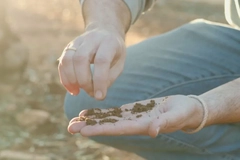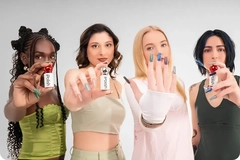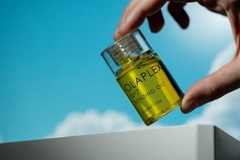Olive pulp “opulence”: Eurofragance unveils upcycled olfactive ingredient
Key takeaways
- Eurofragance announces Olivante, a fragrance ingredient made from upcycled olive pulp.
- The ingredient is said to add depth to fine fragrance and personal care products.
- Olivante highlights the growing trend of upcycling and sustainable innovation in beauty.

Eurofragance has introduced Olivante, a proprietary perfumery ingredient made from an entirely natural, eco-friendly process that transforms olive byproducts into a high-quality fragrance raw material.
The Spanish fragrance house says the ingredient delivers richness to fine fragrances and personal care applications, and appeals to Middle Eastern and Western consumers who seek natural “opulence.”
“In recent years, we have seen how consumers in the West have opened up to Middle Eastern perfumery. Powerful notes of leather and oud have gained consumer acceptance well beyond the Gulf Region. Olivante is multi-faceted and offers some of these olfactive aspects that are now appreciated across geographies,” says Belén Garcia, master perfumer at Eurofragance.
The company will unveil Olivante at Beautyworld Middle East in Dubai, UAE, on October 27, 2025. The launch will mark Eurofragance’s fourth perfumery ingredient.
“Our initial trials formulating personal care and home fragrancing products with Olivante are promising, and we feel that this is a proprietary ingredient with strong potential for broader market adoption,” adds Sine Guçetil, global marketing director at Eurofragance.
Sourcing scents
Olivante exemplifies the industry’s circular economy approach to fragrance creation. It is derived from upcycled olive pulp left over after oil extraction, which Eurofragance says is why the ingredient has no oily smell. The waste material would otherwise be discarded.
Eurofragance collaborated with a partner in the olive oil industry to ensure ethical and sustainable sourcing.
According to the company, not all olive pulp can be used, as only specific varieties produce the desired aromatic complexity.
“Olivante cannot be made from any random olive pulp. Terroir and climate from a very specific region of Spain are key to this project. Then we applied our scientific expertise to characterize and separate the essential odorant molecules needed to develop a desirable captive ingredient,” Felipe San Juan, R&D manager, Ingredients and Fragrance Performance, and Magdalena Rey, technical perfumer, both at Eurofragance, explain.
.webp) According to Eurofragance, terroir and climate from a very specific region of Spain are key to this project.After the oil is extracted, Eurofragance’s R&D experts refine the olive pulp in an eco-friendly, multi-step purification process. The process isolates and enhances the essential odorant molecules that make up Olivante’s scent profile.
According to Eurofragance, terroir and climate from a very specific region of Spain are key to this project.After the oil is extracted, Eurofragance’s R&D experts refine the olive pulp in an eco-friendly, multi-step purification process. The process isolates and enhances the essential odorant molecules that make up Olivante’s scent profile.
Furthermore, the transformation method avoids synthetic additives, making the patent-pending ingredient 100% natural and biodegradable.
Eurofragance says Olivante adds phenolic, animalic depth reminiscent of castoreum — a note highly valued in Middle Eastern perfumery. It also enhances fruity, gourmand, and white floral notes in Western-style fragrances.
Reimagined through waste
Upcycled ingredients offer a valuable way to meet growing consumer demands for sustainable cosmetics. Innova Market Insights data suggests that product launches in the personal care sector featuring upcycled ingredients soared by 196% between April 2020 and March 2025.
According to the research, half of global consumers said they actively seek out upcycled ingredients when shopping for beauty and personal care products, signaling a growing demand for sustainability-driven innovation.
“Upcycled ingredients hold immense value in today’s personal care formulation landscape. They embody a commitment to sustainability, environmental protection, and ethics by transforming waste and byproduct materials into high-quality cosmetic ingredients,” a representative of Givaudan Active Beauty previously told Personal Care Insights.













